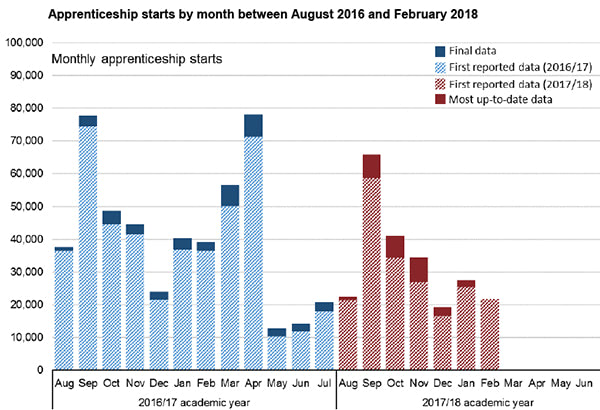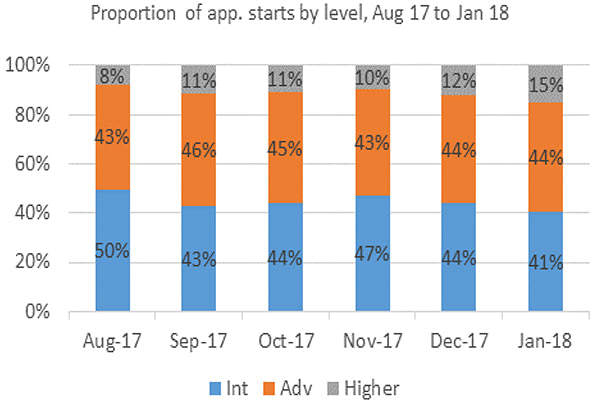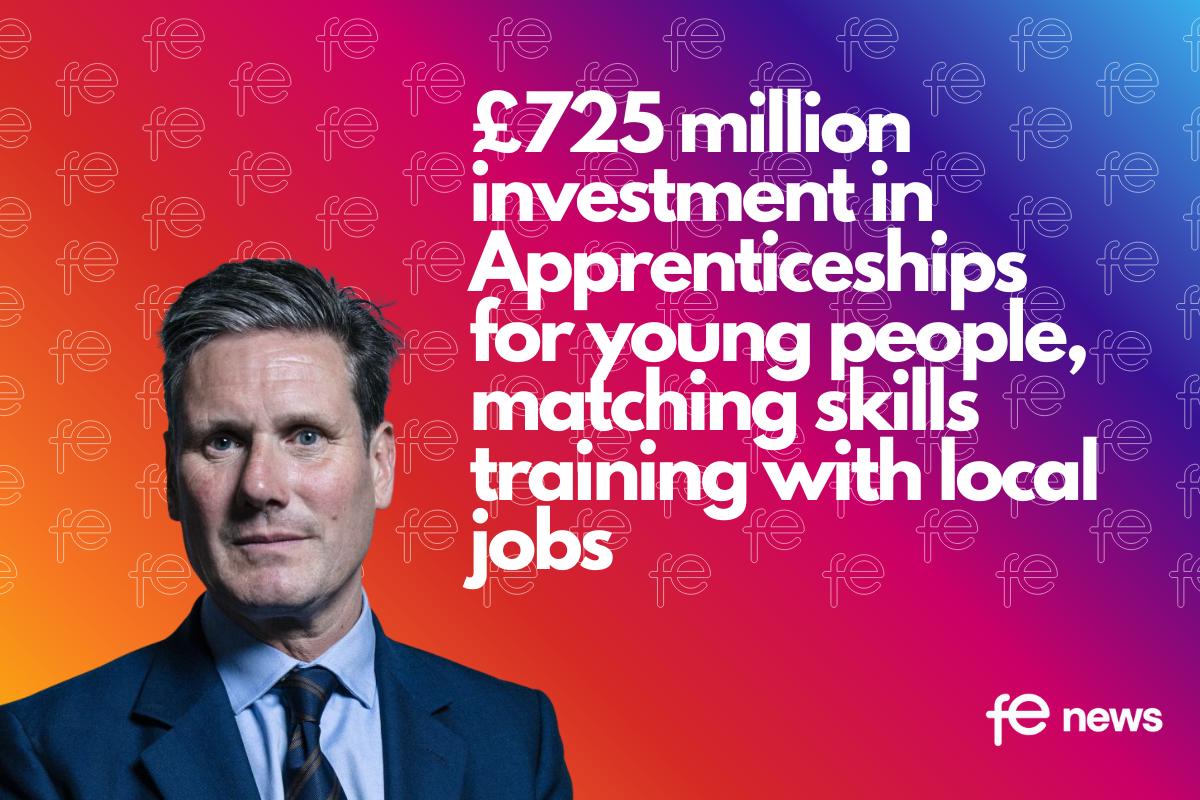Address the drop in apprenticeship starts and respond to Brexit

Paul Warner addressing the Westminster Employment Forum Keynote Seminar: Improving participation and diversity in apprenticeships – tackling skills gaps, raising awareness and supporting under-represented groups
Apprenticeships have undergone a huge system change over the last year, one that’s indeed been in preparation for some years before that. The introduction of the Levy is the part that the man on the street might most readily recognise though, if they recognise anything at all about apprenticeships being reformed, but the changes go much deeper than just funding, they’re not just about how the funding for apprenticeships is generated and where it flows to, but it’s about the very essence of them.
What is an apprenticeship or what should it be?
Now this is a central tenet of very many discussions recently and we’ve once again seen arguments arising that variously apprenticeships are currently being pitched at too low level, and/or that the sectors and occupations they’re being offered in are somehow not worthy of having an apprenticeship.
We’re seeing criticisms that companies are rebadging existing training programmes and calling them apprenticeships even when they’re not, just to engineer a way to reclaim their Levy money to pay for something that they would probably do anyway.
Now firstly I think a lot of these arguments frequently miss the point and I will come back and deal with that again in a moment. Secondly by constantly rehashing these arguments we do nothing really except decry the overall notion of apprenticeships for everyone, and that can’t be right.
Now I’m certainly not saying that apprenticeships are perfect and no one should criticise them, far from it, AELP has been very vocal in challenging a number of aspects of the reform programme, but I am saying that just reviving past arguments that we’ve already had and have already addressed is not what employers or learners currently need.
Now the effect is palpable, as well as the release of apprenticeship figures from last week continues to demonstrate.
Apprenticeship starts by month, over the last couple of years.

Unfortunately once you get to grips with what’s on there you don’t need to be an expert in graphs to read when the new Levy came into force, it was there at April 2017 where you see the massive drop.
And if you notice going forward from that, the numbers have never really recovered. A like for like comparison of August starts, for example, sees a drop of around 17,000, the following month around 10,000 and October around about 9,000.
Now the Government have tried to say this was all expected, which is true actually, and it was to be expected given a change in this system of this magnitude, that’s all true. We were saying for ages beforehand there would be a cliff fall in numbers as soon as the Levy started.
However that doesn’t mean that this isn’t something to worry about, because the reason for the drop is not just as simple as saying, well it’s all new and people need to get used to it, but they’ll come round and numbers will recover.
We need to look at another graph really to illustrate what’s going on here. Now this shows a breakdown of what is actually being started under the Apprenticeship Levy and what you can see there is there is a definite shift going on, we are seeing more and more higher level apprenticeships being started, they’ve nearly doubled their share of starts in 6 months.

Meanwhile note what is happening at the other end, at Level 2. In 6 months we’ve lost nearly 1 in 5 Level 2 starts. In other words the Levy is being used to increasingly fund higher level and thus more expensive apprenticeships, and thus fewer of them.
There is clear evidence that higher level learners give a better return on productivity and employers recognise that, so they’re shifting their apprenticeship employment up the scale.
If they are going to employ someone as an apprentice, if they are going to take that cost, they will employ as few as they can to give them the highest return possible, and that is best done with higher level apprenticeships. So the more this shift goes on so the year on year drop will just continue.
I am not, incidentally, criticising anyone or any employer for doing this. Higher level and degree apprenticeships are incredibly valuable and they are a very welcome addition to the education landscape, they fill in many missing rungs of the vocational training ladder that will allow learners’ progression as far as they want to go in their chosen professions, and clearly this is particularly true of management apprenticeships.
But the perverse incentive for some employers to rebadge existing training schemes as an apprenticeship is not actually an indicator of a fault in the concept of apprenticeships, it’s a function of the system which supports and funds apprenticeship delivery, and that’s something quite different. If employers are doing the training anyway, and then the system gives them an option to do it for free, it’s hardly surprising if some of them choose to do that.
That’s not a criticism of apprenticeships, it’s a criticism of the implementation of the funding system surrounding apprenticeships, and we mustn’t let these distinctions muddy the waters of what is and isn’t important regarding the training itself.
Now an apprenticeship is definitely gaining a caché that perhaps it never used to have, so for some employers to be prepared to adjust the content of their existing training to enable it to be considered an apprenticeship may actually be a sign that the fundamental concept is a valuable one. After all they wouldn’t be doing it all if the end output was not considered to be of inherent value to their business.
Level 2 Apprenticeships
What I’m really worried about though is that the system is not making any allowances for what is happening further down the ladder, at Level 2. The opportunities are shrinking in terms of volume, and on top of that you had criticisms that perhaps Level 2 shouldn’t be considered an apprenticeship anyway, which can help to compound the general decline in outtake at that level.
Following that path will eventually mean that you have a very polarised workforce in terms of skills, all or nothing and no one coming up the ladder, no pipeline in the system to ensure steady progress of people, and no one in between.
Just the great unwashed on one side, and lots of highly skilled people on the other.
What you will get following that path is a more extreme version of this hourglass skills profile that we already have, which is one that we keep saying we don’t want.
The argument that Level 2 can’t be an apprenticeship is, in my view, nonsense. Learners do not get the chance to work to Level 2 in many technical occupations before finishing school at 16, so if they want to enter an occupation they have to start with the basics, the basics are at Level 2, so why should that not be considered an apprenticeship?
I’ve heard it argued that no one is saying that skills at Level 2 should not be studied, just that they shouldn’t be accredited separately as an apprenticeship, the inference being that you can study and acquire these skills on the way through to, and as part of your studies to gain a Level 3.
Well that being the case, why do we bother having GCSEs then, because GCSEs are a Level 2 academic qualification, why don’t we just scrap them and consider them part of a route to Level 3 with no separate accreditation being applied for them.
If it’s important to have a defined Level 2 as part of an academic pathway, why should there not be a similar stopping off point on vocational pathways?
Apprenticeship Worthy Occupations
I’ve heard many criticisms that some occupations are somehow not worthy of an apprenticeship, that apprenticeships are somehow only right for traditional craft occupations and you can’t really be said to have done an apprenticeship if you are, for example, in the hospitality industry.
Well why not? We have an economy that is 80% service sector based and you’re trying to tell me that only 20% of it deserves to have a system of high quality education and training and that the rest can just go hang.
I did a TV interview the other day and I was in the green room beforehand having the bags under my eyes covered up with make-up and I had the make-up lady give me a really hard time about apprenticeships, much harder than TV presenter actually did.
She was absolutely off on one about KFC. How can you have an apprenticeship in frying chicken, it’s ridiculous. I said to her at one point, when I could get a word in edgeways, well would you rather the person frying the chicken had no training then? And she paused and she said, well obviously I want them to be trained, but it’s not an apprenticeship is it? Well no it’s not, but nobody said it was an apprenticeship in frying chicken.
There is a conflation going on between the apprenticeship and the role that hosts it that is sometimes not entirely helpful. The role, the job may well be described as frying chicken, but the apprenticeship that the role offers goes far beyond that, it goes into health and safety and customer service and hygiene and catering and all sorts, the basic building blocks, in fact, of a career going forward in a broader hospitality sector.
Why is that a bad thing? Why is it a bad thing that a job that could attract such apparent scorn as frying chicken in a takeaway should have assigned to it a broader training scheme that will allow the person in that role to progress a career in a number of different directions.
To scorn some roles and sectors as not worthy of apprenticeships is just elitist and it’s self-defeating, and to compound that by saying even where it does exist it shouldn’t exist below Level 3 shows a total misunderstanding of many occupational models and route ways.
Brexit
We cannot afford to keep indulging this sort of snobbery about occupations and vocational training any longer, besides anything else Brexit is bearing down on us, and whilst that is by no means the reason for an urgency in dealing with these issues of technical training, it is shining a harsh light on our deficiencies in this area and it forces us to confront some of the problems we’ve perhaps been hiding away from for years.
Certainly the decision to exit the EU has made many sectors re-evaluate both their workforce and the training they offer them, in the light of possible restrictions on their ability to recruit from Europe and elsewhere in the future.
In the care sector, for example, a sector highly reliant on EU migration and one known to have a high turnover rate, I saw a figure of currently nearly 28% the other day, in care the Nuffield Trust is estimating there will be a shortfall of 70,000 social care workers by 2025/26, figures that should truly alarm Government, given our increasing requirement for some degree of care as the population ages.
To fill this shortfall qualifications at Level 2 will be really important to both engage home grown recruits into the profession and to give them a grounding to sustain the career and take it forward, and not just bail out at the first opportunity.
So to somehow claim that this Level is not worthy of the name of an apprenticeship, or that its sector isn’t worthy of one is just ridiculous, it doesn’t take much to envisage the people who are saying that sitting in their care homes in a few years’ time wondering why there are so many highly paid managers around the place and so few carers actually doing the work to look after them.
Well, have a think about your argument and what you’re saying right now, because by decrying the value of Level 2 apprenticeships, that’s exactly where your argument is going to take us.
Brexit is by no means a reason for apprenticeships to exist. It does, however, throw into stark relief how vital it is that we formulate a system that will ensure that we can develop and grow our home talent base without reliance on migrant labour, wherever that may come from.
The apprenticeship system has a lot going for it, but it is not a panacea for all ills, it will not cure unemployment and it’s unremitting focus on productivity and occupations doesn’t mean that it can be relied on to provide a wider and more holistic spread of learning beyond that which employers may feel is directly in their interest.
It is, however, a concept that people are comfortable with and can grasp and they can work with a range of levels. So let’s not undermine that by overlaying it with objections that ultimately amount to a misunderstanding of what they and what they seek to achieve, and by doing so choke off the excellent opportunity they can give to engage in work, to engage in learning and promote inclusiveness and social mobility.
Paul Warner, Director of Research and Development, Association of Employment and Learning Providers
Despite best endeavours to ensure accuracy, text based on transcription may contain errors which could alter the intended meaning of any portion of the reported content. Speakers have not had the opportunity for any corrections.











Responses